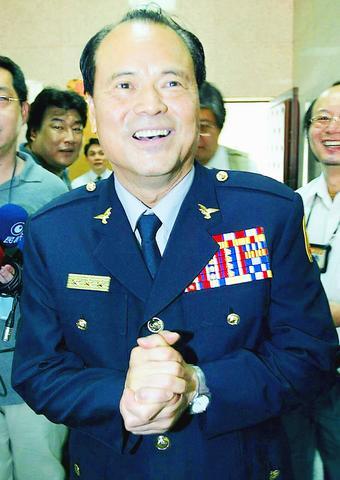The Executive Yuan yesterday approved the appointment of Aviation Police Bureau Commissioner Chang Si-liang (
Outgoing National Police Administration (NPA) Director-General Wang Chin-wang (
Chang's appointment to the top post for police officers was the front-page story for major Chinese-language newspapers on Saturday.

PHOTO: TONY YAO, TAIPEI TIMES
Chang's promotion was high-lighted because he would be the first APB commissioner to take over the top NPA slot.
Chang's advancement is equal to NPA's Criminal Investigation Bureau (CIB) Commissioner Hou You-yi's (
According to the police-promotion system, NPA director-generals have usually been promoted from the job of CIB commissioner, Central Police University president, commissioner of Taipei City Police Department or Kaohsiung City Police Department. All previous NPA director-generals had one thing in common -- they were all criminal investigation experts.
When approached by reporters last Saturday, Chang tried to keep a low profile and said that he has not received any notice of a promotion from his supervisor.
"I actually learned of my `promotion' from the newspapers as well," Chang said. "To lead the 70,000 police officers in this country is definitely not an easy job, but I shall do my best if my superior officers really want me to do it. However, since the Ministry of the Interior has not announced the new NPA director-general, it is not proper for me to comment at this moment."
Like Hou, Chang studied in the criminal investigation department at Central Police University, but he graduated in 1965, 15 years earlier than Hou.
The 62-year-old Chang was born in Hsinchu but grew up in Taipei. After he finished college, he started his police career as a detective in the CIB.
Prior to his taking the APB job in 1999, he served as head of the Chungcheng Second and Taitung precincts of the Taipei City Police Department, as Hualien Police Department commissioner, APB deputy commissioner, Taipei City Police Department deputy commissioner and Third Peace Preservation Police chief.
Chang served as deputy commissioner of Taipei's Police Department under Wang. Hou was the chief officer of the city police's Criminal Investigation Division at that time.
Chang has earned public credit for his criminal investigation and public-relations expertise since his term as APB deputy commissioner.
Between 1993 and 1994, 12 Chinese jetliners were hijacked to this country. Chang was in charge of handling the hijacking cases. He was able to get the hijackers to surrender within a short time after their arrival, thereby assuring the safety of cabin crew and passengers alike and helped them return to China.
He also has a good relationship with the press.
During the 12 hijackings, he was spotlighted by the press because he provided key and immediate information for reporters.
Chang is regarded as an authority on anti-terrorism. After the Sept. 11 attacks on the US, Chang established an anti-terrorism mechanism for all the airports in this country.
With an easy-going personality, Chang enjoys making friends and this has helped him develop good relations and links to politicians and the business community. However, some critics consider him a sycophant.
Among Chang's close friends, the Evergreen Group (長榮集團) Chairman Chang Yung-fa (張榮發) and former NPA director-general Chuang Heng-dai (莊亨岱) are seen as key players behind his latest promotion.

Alain Robert, known as the "French Spider-Man," praised Alex Honnold as exceptionally well-prepared after the US climber completed a free solo ascent of Taipei 101 yesterday. Robert said Honnold's ascent of the 508m-tall skyscraper in just more than one-and-a-half hours without using safety ropes or equipment was a remarkable achievement. "This is my life," he said in an interview conducted in French, adding that he liked the feeling of being "on the edge of danger." The 63-year-old Frenchman climbed Taipei 101 using ropes in December 2004, taking about four hours to reach the top. On a one-to-10 scale of difficulty, Robert said Taipei 101

Nipah virus infection is to be officially listed as a category 5 notifiable infectious disease in Taiwan in March, while clinical treatment guidelines are being formulated, the Centers for Disease Control (CDC) said yesterday. With Nipah infections being reported in other countries and considering its relatively high fatality rate, the centers on Jan. 16 announced that it would be listed as a notifiable infectious disease to bolster the nation’s systematic early warning system and increase public awareness, the CDC said. Bangladesh reported four fatal cases last year in separate districts, with three linked to raw date palm sap consumption, CDC Epidemic Intelligence

Two Taiwanese prosecutors were questioned by Chinese security personnel at their hotel during a trip to China’s Henan Province this month, the Mainland Affairs Council (MAC) said yesterday. The officers had personal information on the prosecutors, including “when they were assigned to their posts, their work locations and job titles,” MAC Deputy Minister and spokesman Liang Wen-chieh (梁文傑) said. On top of asking about their agencies and positions, the officers also questioned the prosecutors about the Cross-Strait Joint Crime-Fighting and Judicial Mutual Assistance Agreement, a pact that serves as the framework for Taiwan-China cooperation on combating crime and providing judicial assistance, Liang

US climber Alex Honnold left Taiwan this morning a day after completing a free-solo ascent of Taipei 101, a feat that drew cheers from onlookers and gained widespread international attention. Honnold yesterday scaled the 101-story skyscraper without a rope or safety harness. The climb — the highest urban free-solo ascent ever attempted — took just more than 90 minutes and was streamed live on Netflix. It was covered by major international news outlets including CNN, the New York Times, the Guardian and the Wall Street Journal. As Honnold prepared to leave Taiwan today, he attracted a crowd when he and his wife, Sanni,